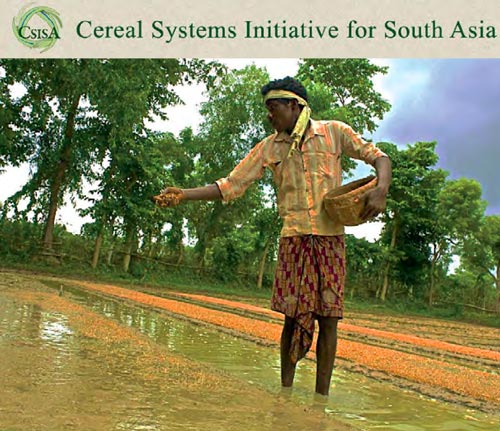Anu Dhar, Cynthia Mathys, Jennifer Johnson
Staff members of the Cereal Systems Initiative for South Asia (CSISA) are developing and implementing projects aimed at improving agricultural production and standards of living for farmers in South Asia, with excellent results. At their “Seed Summit for Enhancing the Seed Supply Chain in Eastern India” meeting in Patna, Bihar on 14-15 May they worked to design solutions to improve the delivery of high-yielding seed varieties in eastern India, a region that has traditionally suffered from lack of access to these varieties and low seed replacement rates. The meeting, which included over 60 seed experts from the government, research and private sectors, focused on topics such as better-targeted subsidies on seeds, improved storage infrastructure and stronger extension systems to increase accessibility and adoption of improved seed varieties.
The roundtable “Sustainable Intensification in South Asia’s Cereal Systems: Investment Strategies for Productivity Growth, Resource Conservation, and Climate Risk Management” was held on 19 May in New Delhi. It brought together 20 firms and entrepreneurs to build collaborative action plans and joint investment strategies under CSISA to identify new product tie-ins, joint ventures, technical collaborations and shared marketing channels in order to bring high-tech farming ideas to India’s risk-prone ecologies.
 In India, CSISA seeks to increase crop yields through the provision of more accurate, location-specific fertilizer recommendations to maize and rice farmers with the “Crop Manager” decision-making tool. The web-based and mobile Android application uses information provided by farmers including field location, planting method, seed variety, typical yields and method of harvesting to create a personalized fertilizer application recommendation at critical crop growth stages to increase yield and profit.
In India, CSISA seeks to increase crop yields through the provision of more accurate, location-specific fertilizer recommendations to maize and rice farmers with the “Crop Manager” decision-making tool. The web-based and mobile Android application uses information provided by farmers including field location, planting method, seed variety, typical yields and method of harvesting to create a personalized fertilizer application recommendation at critical crop growth stages to increase yield and profit.
CSISA-Nepal has initiated a series of participatory research trials in farmers’ fields, in order to promote maize triple cropping, the practice of planting maize during the spring period after winter crop harvesting, when fields would usually be fallow. The practice, while proven to be highly remunerative, is not widely popular. The trials seek to determine optimum management practices for maize in order to encourage triple cropping and to generate additional income for farmers.
Greater gender equality in agriculture is also an important goal of CSISA, supported through the creation of Kisan Sakhi, a support group to empower women farmers in Bihar, India by “disseminating new climate-resilient and sustainable farming technologies and practices that will reduce women’s drudgery and bridge the gender gap in agriculture.” A CSISA-Bangladesh project has already had a positive impact on the lives of rural women, providing new farming and pond management techniques that have helped them to greatly increase the productivity of their fish ponds and gain new respect within their families and communities.
 Climate adaptation and mitigation
Climate adaptation and mitigation 
